Homer’s
Odyssey is but a journey in the Mediterranean, the land of civilizations
and myths. It is the quest of Ulysses that unites this land into a continuum.
The defeated Trojans along with the triumphant Greeks, wondering in the Mediterranean,
created stories that rose to mythical proportions. Ulysses who, after the end
of the Trojan War, wondered for 20 years desperately seeking Ithaki and suffered
many hardships, describes his homeland in Homer’s
Odyssey (9.20):
I am Odysseus, son of Laertes, who am known among men for all manner of wiles,
and my fame reaches unto heaven. But I dwell in clear-seen Ithaca, wherein is
a mountain, Neriton, covered with waving forests, conspicuous from afar; and
round it lie many isles hard by one another, Dulichium, and Same, and wooded
Zacynthus. Ithaca itself lies close in to the mainland the furthest toward the
gloom, but the others lie apart toward the Dawn and the sun--a rugged isle, but
a good nurse of young men; and for myself no other thing can I see sweeter than
one's own land. [Translated by A.T. Murray]

emories
of this great hero abound on the island and even though nothing is yet
confirmed, many locations have been identified with places mentioned in
the
Odyssey. The Arethousa fountain, the Eumaeus cave, the Cave
of the Nymphs, Neriton mountain etc. The city where the Palace of Ulysses
stood has not yet been identified with the city of Ithaki. It’s most possible
location is on the north of the Island, which has always been most fertile;
traces of its continual habitation date back to the Neolithic era and numerous
archaeological finds have been discovered.
It is worth mentioning the words of Ulysses from the moment he wakes up on the
beach of Ithaki and next to him lie the treasures offered by the people of neighboring
Corfu. When Ulyses opened his eyes, he sees goddess Athena standing in front
of him [
Odyessy 330]:
Then the goddess, flashing-eyed Athena, answered him: “Ever such is the thought
in thy breast, and therefore it is that I cannot leave thee in thy sorrow, for
thou art soft of speech, keen of wit, and prudent. Eagerly would another man
on his return from wanderings have hastened to behold in his halls his children
and his wife; but thou art not yet minded to know or learn of aught, till
thou hast furthermore proved thy wife, who abides as of old in her halls, and
ever sorrowfully for her the nights and days wane, as she weeps. But as for me,
I never doubted of this, but in my heart knew it well, that thou wouldest come
home after losing all thy comrades. Yet, thou must know, I was not minded to
strive against Poseidon, my father's brother, who laid up wrath in his heart
against thee, angered that thou didst blind his dear son. But come, I will shew
thee the land of Ithaca, that thou mayest be sure. This is the harbor of Phorcys,
the old man of the sea, and here at the head of the harbor is the long-leafed
olive tree, and near it is the pleasant, shadowy cave, sacred to the nymphs that
are called Naiads. This, thou must know, is the vaulted cave in which thou wast
wont to offer to the nymphs many hecatombs that bring fulfillment; and yonder
is Mount Neriton, clothed with its forests.” So spake the goddess, and scattered
the mist, and the land appeared. Glad then was the much-enduring, goodly Odysseus,
rejoicing in his own land, and he kissed the earth, the giver of grain. And
straightway he prayed to the nymphs with upstretched hands: “Ye Naiad Nymphs,
daughters of Zeus, never did I think to behold you again, but now I hail you
with loving prayers. Aye, and gifts too will I give, as aforetime, if the daughter
of Zeus, she that drives the spoil, shall graciously grant me to live, and
shall bring to manhood my dear son.” Then the goddess, flashing-eyed Athena,
answered him again: “Be of good cheer, and let not these things distress thy
heart. But let us now forthwith set thy goods in the innermost recess of the
wondrous cave, where they may abide for thee in safety, and let us ourselves
take thought how all may be far the best. So saying, the goddess entered the
shadowy cave and searched out its hiding-places. And Odysseus brought all the
treasure thither, the gold and the stubborn bronze and the finely-wrought raiment,
which the Phaeacians gave him.
[Translated by A.T. Murray.]
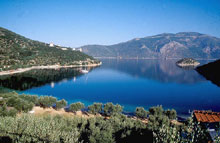 |
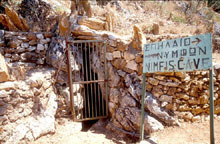 |
| On this beach, in Forkyna Gulf (today called Gulf
of Molos), Athena found Ulysses and helped him clear his mind by
showing him Neriton mountain (in the background of the picture). |
Entrance to the Cave of the Nymphs, in which archaeological
excavations brought to light significant finds. According to Homer,
it is here that Ulysses hid the treasures offered to him by the people
of Corfu. |
| |
After helping Ulysses clear his mind, Athena gave him instructions how
he will face his wife’s suitors and urged him to go and find his loyal
swineherd
Eumaeus:
And for thyself, do thou go first of all to the swineherd who keeps thy swine,
and withal has a kindly heart towards thee, and loves thy son and constant Penelope.
Thou wilt find him abiding by the swine, and they are feeding by the rock of
Corax and the spring Arethousa (…) [Translated by A.T. Murray.]
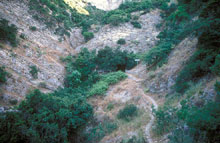 |
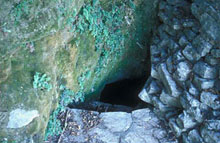 |
| The Fountain of Arethousa.
The cave of Eumaeus lies right above the fountain and can be reached
only on foot; to get to the level of the water one should walk down
a few steps. |
| |
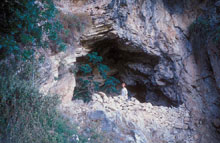 |
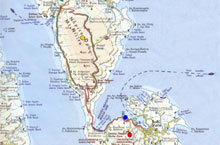 |
| The cave of Eumaeus right above the Arethousa Fountain. |
When Ulysses arrived at the Gulf of Forkyna (blue
circle) he hid his treasures into the Cave of the Nymphs (red circle).
Then dressed as a beggar he found his beloved swineherd Eumaeus who
lived in a cave near the Fountain of Arethousa (green circle). Ulysses’
palace was probably on the northern part of the island (azure circle).
Mountain Neriton is signaled by the yellow circle.
(Map © Ionian
Islands published by Leadercom) |
| |
Then Athena touched him with her magic wand and turned him into a beggar:
So saying, Athena touched him with her wand.She withered the fair flesh on his
supple limbs, and destroyed the flaxen hair from off his head, and about all
his limbs she put the skin of an aged old man. And she dimmed his two eyes that
were before so beautiful, and clothed him in other raiment, a vile ragged cloak
and a tunic, tattered garments and foul, begrimed with filthy smoke. And about
him she cast the great skin of a swift hind, stripped of the hair, and she gave
him a staff, and a miserable wallet, full of holes, slung by a twisted cord.
[Translated by A.T. Murray.]
The visitor can witness the recent history of the island in the Folklore-Nautical
Muesum in Vathi. At the moment the old power-station of the city houses the
exhibits of the museum, among which one finds old costumes, furniture, tools
used in agriculture along with memorabilia from the Commercial Navy School.
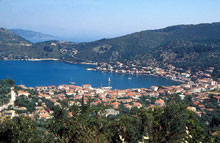 |
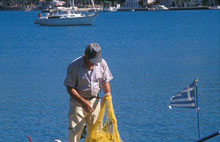 |
| Ithaki has to offer eye-soothing scenery
of peacefulness and light. |
| |